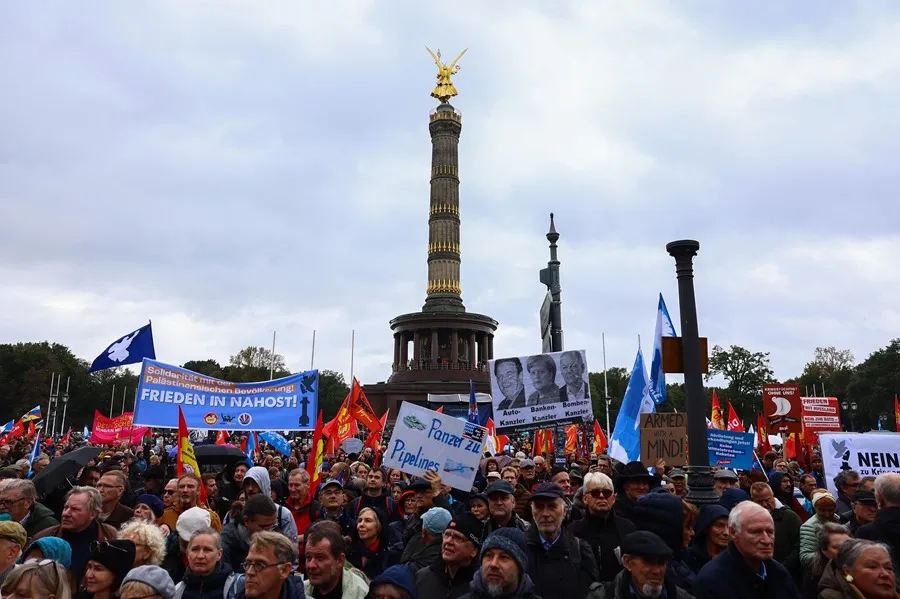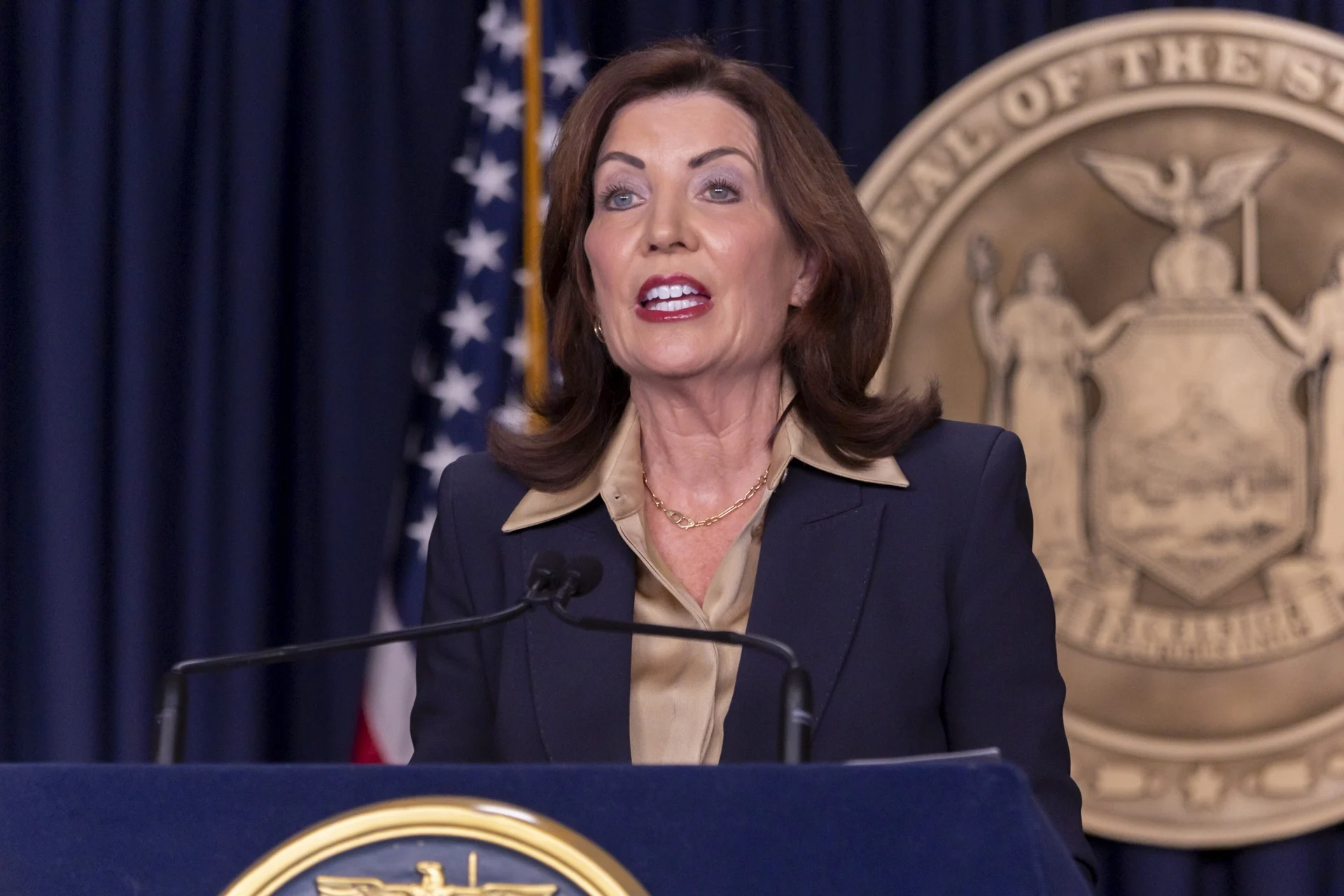International
Germany celebrates 34 years of reunification but with political cracks due to populism

The Germans celebrate 34 years of reunification, a process that ended with the division of the two Germanys, although the recent electoral behavior of the East Germans, where populist parties have become strong, cracks the traditional political scenario of the country.
Behind the festive atmosphere marked by the events of the 34º anniversary of the reunification led by Chancellor Helmut Kohl, a concern weighs the political reality: the booming populism of the far-right Alternative for Germany (AfD) and the leftist Sahra Wagenknecht Alliance (BSW).
The results of these parties in appointments such as the European elections last June or the recent elections of the federal states of Eastern Thuringia, Saxony and Brandenburg, have hit the Central European nation, in which new political divisions between East and West seem to be opening up.
“In 1989, the two Germanys started from different economic and social points and the expectation was that soon there would be an equalization and that would also equalize political points of view,” Martin Schulze Wessel, historian at the University of Munich and expert in Eastern Europe, told EFE.
“At the socio-economic level there is still no equalization, although progress is being made in that direction, but with regard to the vision of politics and political culture, that equalization has not taken place, moreover, there have been new divergences,” he said.
Schulze Wessel alludes to the fact that, after 35 years of the fall of the Berlin Wall, the standard of living in what was the German Democratic Republic (GDR) has increased although the gap between the east and the west is still observed in data such as that the East Germans receive a salary 14% lower than the Westerners, according to data from the Hans Böckler Foundation, a study center specialized in the Teutonic world of work.
This Thursday, in a speech delivered in the city of Schwerin (northeast), Scholz invited to abandon the idea that total equality between east and west in Germany can take place.
“The idea that unification would end completely when the situation in the east would be exactly the same as that in the west, when there is no west that is a single unit, is an idea that does not help us,” Scholz said in the context of the celebration of German Unity Day.
Strong populism in the east
Politically, the east has a different dynamic, as shown by the fact that in the last European elections AfD was – with few exceptions such as Berlin – the most voted force in what constituted the GDR, while in the western territory it swept away the Christian Democratic Union (CDU).
In those elections, the CDU won with 30% of the votes, followed by the AfD, with 15.9%, the Social Democratic Party of Germany (SPD, 13.9%) and The Greens (11.9%).
In the European elections, BSW broke out with 6.7%, a percentage celebrated as a success because that formation was barely a few months old and because, in East Germany, the party of the leftist figure Sahra Wagenknecht managed to be the most voted party, after AfD and the CDU.
According to Daniel Kubiak, a researcher at the Humboldt University of Berlin, told EFE, “we can see that the party system of East Germany differs from the West, because in the west there are still two majority parties (CDU, SPD), which have been joined by the Greens, the FDP and AfD, and it is largely stable.”
“The east is more volatile and people tend to vote for parties located at the ends,” he added.
This, according to Kubiak, is not something unique in Europe, since the vote has also become more volatile in other nations of Europe, such as France, Italy, Poland or Austria, the latter country in which the far-right Freedom Party of Austria (FPÖ) won the legislative elections last Sunday.
The end of the consensus on aid to Ukraine
Among the issues with which AfD and BSW differed in the European elections, but also in the federal states of the east that voted in September, where the far-right formation won in Thuringia, while the Wagenkecht party is emerging as a government partner in Saxony and Brandenburg, is the opposition to military support for Ukraine.
AfD and BSW want Germany to break with the current policy of German Chancellor Olaf Scholz, who has turned his country into the nation in Europe that provides the most military aid to Ukraine.
“The European elections and the elections in the federal states of the east have shown a division and that there are populist parties, the far-right AfD and BSW, that go out of the consensus of the other parties, and there seems to be a rift between east and west,” Schulze Wessel concluded.
International
New York Announces First 2,000 Seats in Universal 2-K Program

The Governor of New York, Kathy Hochul, and New York City Mayor Zohran Mamdani took another step today in their universal early education agenda by announcing the communities that will have access to the first 2,000 seats in the new 2-K program this fall — an initiative backed by a $73 million investment.
The funding is part of the $1.2 billion package previously unveiled by Hochul to strengthen child care and early childhood education across the city, one of the key campaign promises of the now Social Democratic mayor.
At the time of the announcement, the governor also outlined additional funds to reinforce the existing 3-K early education infrastructure, a program launched under former Mayor Bill de Blasio (2014–2021).
When the 2-K initiative was introduced in January, Mayor Mamdani explained that its first phase would offer 2,000 seats, with the goal of eventually expanding into a universal program — a commitment supported by the governor.
State investment in child care and preschool services is expected to increase to $4.5 billion by fiscal year 2027.
Among the first communities set to benefit from the 2,000 seats are Upper Manhattan and Inwood — areas with large Dominican populations — as well as Fordham and Kingsbridge in the Bronx, a borough with a Latino majority.
In East Brooklyn, Canarsie, Brownsville, and Ocean Hill will also be included. Meanwhile, Ozone Park and the Rockaways are among the neighborhoods that will see the rollout of the 2-K program.
International
Warner Bros. Developing First ‘Game of Thrones’ Movie With ‘Andor’ Writer

Warner Bros. is developing the first feature film based on the hit saga Game of Thrones, with Beau Willimon — screenwriter of Andor — attached to direct, according to a report published Tuesday by Page Six.
The project, currently in early development, will focus on the conquest of King Aegon I Targaryen. A separate television adaptation centered on the same historical storyline within the franchise is also in early stages at HBO.
However, the outlet noted that it remains unclear whether the film will move forward following the recent acquisition of Warner Bros. Discovery by Paramount Skydance.
If the merger is finalized, the movie could potentially be shelved, although that scenario appears unlikely given that the Game of Thrones franchise remains one of HBO’s most valuable and beloved properties.
After six seasons adapting the work of George R. R. Martin, the platform expanded the universe with House of the Dragon, a prequel series set 200 years before the events of Game of Thrones that explores the history of House Targaryen.
International
Spain’s Prime Minister to Address Nation Amid Trump’s Trade Threats

The Prime Minister of Spain, Pedro Sánchez, will deliver an institutional address this Wednesday at the Moncloa Palace regarding the escalating situation in the Middle East and recent threats directed at Spain by U.S. President Donald Trump.
The Spanish government announced that Sánchez will make a statement at 9:00 a.m. local time to outline his position on the latest developments following the U.S. and Israeli attacks on Iran.
Sánchez is expected to reiterate Spain’s reasons for opposing the use of U.S. military bases on Spanish soil in the operation—an action he has already described as being outside international law—while also expressing criticism of the Iranian regime.
Government sources indicated that the address had been planned prior to Trump’s remarks criticizing Spain’s stance. However, following those comments, Sánchez is now also expected to respond directly to the U.S. president’s statements.
Trump has threatened to “cut all trade with Spain” and said he wants “nothing to do” with the country after Madrid refused to authorize the use of the Morón and Rota military bases in southern Spain for operations against Tehran.
The U.S. president also labeled Spain “a terrible NATO partner” and warned that “no one” would tell him he could not use the facilities.
In response, the Spanish government stated that Spain fulfills its commitments to NATO and European defense. It also warned Trump that any review of bilateral trade relations must respect international law and the agreements in place between the European Union and the United States.
-

 International3 days ago
International3 days agoIran Reports 201 Dead, 747 Injured After U.S. and Israeli Strikes
-

 International3 days ago
International3 days agoPope Leo XIV Urges End to ‘Spiral of Violence’ in Middle East
-

 International2 days ago
International2 days agoBrazil’s Supreme Court Rejects Bolsonaro’s Bid for House Arrest
-

 International4 days ago
International4 days agoSecurity Council to Hold Emergency Meeting on Middle East Crisis
-

 International5 days ago
International5 days agoTrump Floats “Friendly Takeover” of Cuba Amid Rising Tensions
-

 Sin categoría4 days ago
Sin categoría4 days agoTrump: ‘We Think It’s True’ Amid Claims Iran’s Supreme Leader Was Killed
-

 International5 days ago
International5 days agoArgentina’s Senate Reviews Milei-Backed Labor Overhaul
-

 International2 days ago
International2 days agoAnti-ICE Billboard Campaign Targets Immigration Spending in 31 U.S. Cities
-

 International2 days ago
International2 days agoTrump Warns of ‘Major Wave’ of Attacks as Iran Conflict Escalates
-

 International2 days ago
International2 days agoMexico Calls for Immediate Probe After National Dies in ICE Custody
-

 International20 hours ago
International20 hours agoSpain’s Prime Minister to Address Nation Amid Trump’s Trade Threats
-

 International19 hours ago
International19 hours agoNew York Announces First 2,000 Seats in Universal 2-K Program
-

 Central America2 days ago
Central America2 days agoPanama Canal Monitoring Trade as Middle East Conflict Disrupts Shipping
-

 International2 days ago
International2 days agoBolivia Orders Three Investigations Into Deadly Military Plane Crash
-

 Central America19 hours ago
Central America19 hours agoGuatemala’s Attorney General Fails in Bid for Top Court Seat Amid Corruption Allegations
-

 International19 hours ago
International19 hours agoWarner Bros. Developing First ‘Game of Thrones’ Movie With ‘Andor’ Writer




























